With 43 jobs set to be axed at Keenan very shortly, following 12 jobs in December, the Alltech-owned diet feeder manufacturer has been making headlines over the past few weeks, for all the wrong reasons.
The Irish Farmers Journal sat down with Alltech CEO Dr Mark Lyons and Keenan CEO Robbie Walker to find out more.
Walker said: “There’s two parts to this story. Part one is that we need to return to profitability. That’s clear. And we’re not profitable, which is why we’re making cuts. Frankly, out of respect for the people that are expected to depart the business, we haven’t been speaking too much about the rosy future, because it’s not the time or place. However, we wouldn’t be doing it if we didn’t expect there was going to be a profitable future with strong growth prospects.
“So that’s part two, the future. There has been talk in the media about us setting up an operation in Turkey. That’s not true. We have spoken to potential partners in Turkey, but we’ve spoken to potential partners in many markets. Turkey does appear to have good potential, but we absolutely have not committed to anything with Turkey at this point.
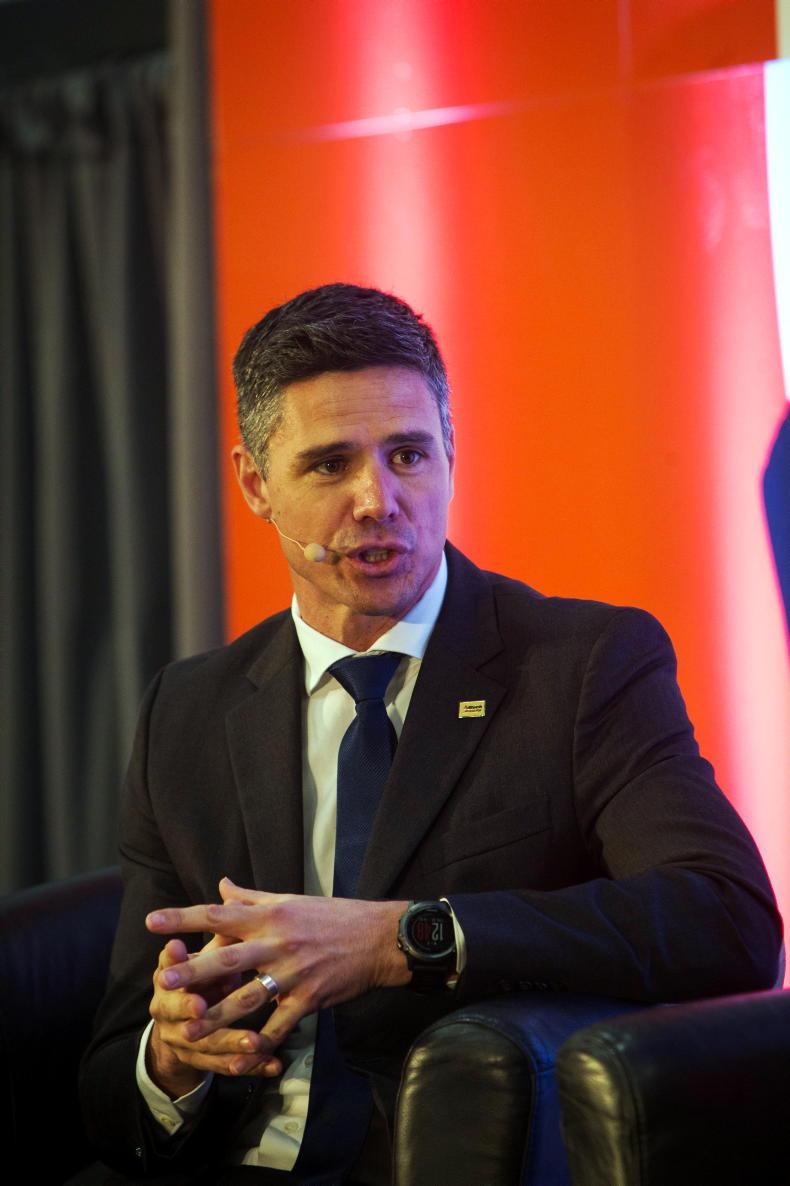
Robert Walker, CEO of Keenan.
“It’s all exploratory. The same goes for the robotics, which we are looking into in Austria and France. And any other partnerships, what’s important is that we return to profitability. Once we’re profitable, we then will be in a position to understand where we need to partner so we can grow.”
Redundancies
Keenan confirmed that 12 voluntary redundancies were handed out in December, for which 16 people applied. The company also confirmed there are 43 roles at risk of redundancy in the current consultation process. Approximately half of the roles are in manufacturing, but the job losses are across all departments and senior management. The Irish Farmers Journal also understands that the four-person sales team on the ground in Ireland have all voluntarily recently left the business.
Walker explained that out of a seven-member senior management team, only two will remain, which follows cuts over the past 12 months. He also confirmed there are no more redundancies planned at Keenan.
“This is very, very clear. It [the redundancies] is to reduce our overheads to return to profitability. So, what we’re doing is reducing our breakeven to a level where we can profitably produce machines and from that lower base, we’re going to be able to grow again.
“Since the acquisition in 2016, we have not been profitable and now we’re saying look, we obviously need to make changes. And those changes need to reduce overheads, so that’s clearly the play here,” said Walker.
Outsourcing production
“There’s nothing set in stone about outsourcing production in the short term. First of all, we started buying machines from Storti in Italy in 2017. The tub and the self-propelled simply because we didn’t have the ability to produce them. And that was at that time an ability for us to get into the market and try it out. We are also in discussions with companies in Austria and France on robotics. We’re in discussions with a company in Germany on anaerobic digesters and biogas.
“A lot of that expertise is based in some of the Western European markets. So no, we’re not outsourcing production to one location. What we’re doing is we’re looking at where we can partner to bring solutions to the entire farm system”, explained Walker.
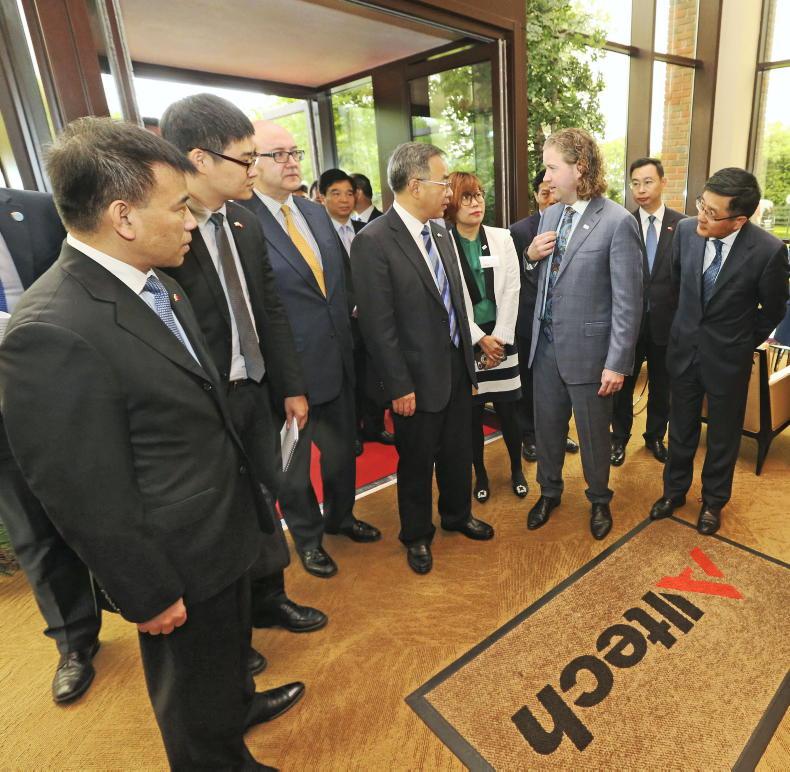
Dr Mark Lyons, CEO of Alltech
He went on to say that Keenan’s long-term plans go well beyond the scope of what it is currently doing in Borris. He said: “In order to be effective going forward, we need to bolster our engineering expertise, which might mean different skill sets. And I think that also means that as we go through this consultation period with these proposed redundancies, we need to be thinking very carefully about what skill sets we need for a future ready business”.
Peter Thomas Keaveney sat down with Mark Lyons and Robbie Walker.
PTK: Can you tell me about the current lead time on new machines. We are hearing it’s in the region of 9-10 months, with €10m worth of machines on order?
RW: “I won’t go into exact numbers, but we have a very strong order book of the magnitude that you’ve said. The lead time is currently around nine months. Many competitor machines have a similar lead time.
“Keenan has been in the very fortunate position of manufacturing entirely from scratch, which means our lead time has always been very short because we make all our own componentry.
“The slowdown in global supply chains mean that everyone’s been equally affected. Much of that slowdown is due to supply chain. However, this is also due to the fact that we are going to be cutting our overheads, which will put pressure on our ability to produce as many machines per week. By ensuring that our facility is profitable, it means we then have a platform to partner for growth.”
Keenan is a household name in Irish manufacturing. Tell us about the current situation?
ML: “Keenan is a business that we’ve been very committed to. Alltech has put huge resources into Keenan over the past years and if I was to be self-critical, I think part of the challenge we’ve had is that when we looked at the Keenan team, when we met them, it was like looking in a mirror. You know the team was very similar to the Alltech teams’ approach and going to market, very customer-focused. When you’ve actually got a business that’s operating relatively well, I think you don’t always look at it in terms of what are potential headwinds that might disrupt the situation.
“We’re in a good manufacturing location in Borris and it’s been a successful location for many. But in reality, if you think from that global context of what I’m sharing of where I see this business going, we’re not going to build a TMR wagon in Borris for an Indian dairy business”.
Keenan accounts for just 1%-1.5% of Alltech’s global business. Has Keenan added to the Alltech business?
ML: “In France, Keenan is as big as Alltech, so it’s a very important vehicle to an important constituency. The Keenan customer is normally a slightly smaller farmer than the Alltech customer. There’s a bit of an overlap, and then that kind of benefits both, because we can take Keenan into larger customers, and Keenan can bring Alltech to smaller customers.
“There’s also challenges. Like when I was in China, here we were trying to sell Keenan to these mega dairies of 5,000 and 10,000 cows. How do you get to them and what do you do? And that’s where I think some of the potential partnerships and collaborations can come in.
“I think Borris and Ireland will continue to be a very important market and location for our team and on the flip side, we’ve got to be thinking, how does Keenan grow into the global footprint of Alltech.”
With such a strong order book, and the industry arguably in a dairy boom, loads of Irish manufacturers are expanding and looking for more staff. The opposite is happening at Keenan – why is this the case?
ML: “It’s bad timing. I think it’s one where we are making changes that I think we needed to have made before getting the business to a position where it’s operating properly and it’s one where what we want to focus on is not the short term.
“Maybe it was a bit remiss of us with so much that was going on between the acquisition of the company amongst several other acquisitions, the passing of my father and the pandemic. We haven’t had the time and the focus on this business, and perhaps also because most of my colleagues are from animal nutrition backgrounds or production agriculture, they’re maybe not from manufacturing. So, this was a bit more like hey, those guys know about that. I’ll leave it over there.”
Is there any particular reason why it was this year that the decision was made to reshuffle Keenan?
ML: “I think part of it is probably last year, if you look at last year, you’ve got huge inflationary pressure. You’ve got challenges all around. We obviously had the Russian invasion of Ukraine that triggered a bunch of different things.
“In reality, I think for Keenan, it probably went from a position of a lot of tailwinds to suddenly a lot of headwinds all at the same time. And I think that provoked a situation.”
Is Alltech cutting 55 jobs in a small Irish town to relocate them overseas for cheaper manufacturing?
ML: “Alltech and Keenan are not going and setting up a facility somewhere else. That’s not the objective here. The objective is how do we make sure that we put ourselves in a position that we can respond and deliver to the customer.
“I think it’s one where we’re managing the situation to get the business synthesised that should be getting the efficiencies where they need to be, focusing on the right types of machines. I think there was a focus very much and almost to incentivise structure and the design of the business where just selling more was what we were after and that’s not the way that business should be run.
“So, at some point we have to draw a line in the sand and say let’s change the model so that we can make sure that we deliver.”
If Keenan enters potential manufacturing partnerships overseas, would you be afraid of losing any of the authenticity of the Irish reputation that the Keenan name was built upon?
ML: “Whatever the team ends up moving ahead with, I think the element of Borris, the innovation, the design, the engineering, you know we’ve seen it around the world. I mean you can buy a Mercedes-Benz, an Audi, a BMW, even a Tesla and you kind of understand the brand and you know the origin of the brand and you focus on that. You don’t necessarily think this was made in a facility 100km from me. And so those are things that I think are important because it’s consistency, the quality. It’s the fact that it stands apart. It’s incumbent upon us that we don’t let the quality slip and we don’t let the brand slip and keep that authenticity”.
Does Alltech have any intention of selling Keenan?
ML: “I don’t think so. We don’t love divestments. I think there’s going to be lots of opportunities for Keenan to partner with other companies and that doesn’t necessarily mean a joint venture or financially linked business model. But I think there are companies out there in different geographies who love the Keenan technology and the brand and would really enjoy the opportunity to partner and maybe bring us to places we would never get to.”
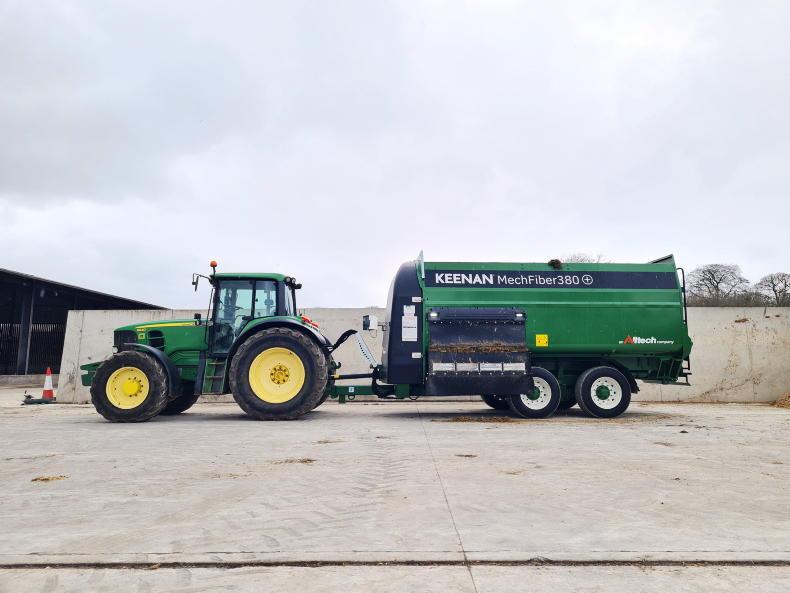
"“There's two parts to this story. Part one is that we need to return to profitability. That's clear. And we're not profitable, which is why we're making cuts".
Long term, do you see Alltech continuing to manufacture some element of machines, and will that continue to be in Borris?
ML: “Yeah, that’s the objective we have. We think that there’s an opportunity to really have a centre of excellence here around what we’re doing that’s on all aspects.”
What is your long-term vision of Keenan in 10 years’ time?
ML: “In 10 years, I think Keenan sits at the heart of Alltech, with its strong base here in Ireland where we’ve been able to develop out a lot of new systems for agriculture that are very much focused around the ‘planet of plenty’ idea we have. An excellent, efficient TMR machine can deliver direct greenhouse gas emissions reduction, that’s been quantified. We’ve had Carbon Trust look at that, it’s something that we can stand behind.
“Why would we not have production capabilities or, certain components being able to be made in all sorts of different locations. I don’t think any business should shy away from that. Every successful Irish business that’s gone truly global has needed to do that and Alltech is an example of that.”
With 43 jobs set to be axed at Keenan very shortly, following 12 jobs in December, the Alltech-owned diet feeder manufacturer has been making headlines over the past few weeks, for all the wrong reasons.
The Irish Farmers Journal sat down with Alltech CEO Dr Mark Lyons and Keenan CEO Robbie Walker to find out more.
Walker said: “There’s two parts to this story. Part one is that we need to return to profitability. That’s clear. And we’re not profitable, which is why we’re making cuts. Frankly, out of respect for the people that are expected to depart the business, we haven’t been speaking too much about the rosy future, because it’s not the time or place. However, we wouldn’t be doing it if we didn’t expect there was going to be a profitable future with strong growth prospects.
“So that’s part two, the future. There has been talk in the media about us setting up an operation in Turkey. That’s not true. We have spoken to potential partners in Turkey, but we’ve spoken to potential partners in many markets. Turkey does appear to have good potential, but we absolutely have not committed to anything with Turkey at this point.

Robert Walker, CEO of Keenan.
“It’s all exploratory. The same goes for the robotics, which we are looking into in Austria and France. And any other partnerships, what’s important is that we return to profitability. Once we’re profitable, we then will be in a position to understand where we need to partner so we can grow.”
Redundancies
Keenan confirmed that 12 voluntary redundancies were handed out in December, for which 16 people applied. The company also confirmed there are 43 roles at risk of redundancy in the current consultation process. Approximately half of the roles are in manufacturing, but the job losses are across all departments and senior management. The Irish Farmers Journal also understands that the four-person sales team on the ground in Ireland have all voluntarily recently left the business.
Walker explained that out of a seven-member senior management team, only two will remain, which follows cuts over the past 12 months. He also confirmed there are no more redundancies planned at Keenan.
“This is very, very clear. It [the redundancies] is to reduce our overheads to return to profitability. So, what we’re doing is reducing our breakeven to a level where we can profitably produce machines and from that lower base, we’re going to be able to grow again.
“Since the acquisition in 2016, we have not been profitable and now we’re saying look, we obviously need to make changes. And those changes need to reduce overheads, so that’s clearly the play here,” said Walker.
Outsourcing production
“There’s nothing set in stone about outsourcing production in the short term. First of all, we started buying machines from Storti in Italy in 2017. The tub and the self-propelled simply because we didn’t have the ability to produce them. And that was at that time an ability for us to get into the market and try it out. We are also in discussions with companies in Austria and France on robotics. We’re in discussions with a company in Germany on anaerobic digesters and biogas.
“A lot of that expertise is based in some of the Western European markets. So no, we’re not outsourcing production to one location. What we’re doing is we’re looking at where we can partner to bring solutions to the entire farm system”, explained Walker.

Dr Mark Lyons, CEO of Alltech
He went on to say that Keenan’s long-term plans go well beyond the scope of what it is currently doing in Borris. He said: “In order to be effective going forward, we need to bolster our engineering expertise, which might mean different skill sets. And I think that also means that as we go through this consultation period with these proposed redundancies, we need to be thinking very carefully about what skill sets we need for a future ready business”.
Peter Thomas Keaveney sat down with Mark Lyons and Robbie Walker.
PTK: Can you tell me about the current lead time on new machines. We are hearing it’s in the region of 9-10 months, with €10m worth of machines on order?
RW: “I won’t go into exact numbers, but we have a very strong order book of the magnitude that you’ve said. The lead time is currently around nine months. Many competitor machines have a similar lead time.
“Keenan has been in the very fortunate position of manufacturing entirely from scratch, which means our lead time has always been very short because we make all our own componentry.
“The slowdown in global supply chains mean that everyone’s been equally affected. Much of that slowdown is due to supply chain. However, this is also due to the fact that we are going to be cutting our overheads, which will put pressure on our ability to produce as many machines per week. By ensuring that our facility is profitable, it means we then have a platform to partner for growth.”
Keenan is a household name in Irish manufacturing. Tell us about the current situation?
ML: “Keenan is a business that we’ve been very committed to. Alltech has put huge resources into Keenan over the past years and if I was to be self-critical, I think part of the challenge we’ve had is that when we looked at the Keenan team, when we met them, it was like looking in a mirror. You know the team was very similar to the Alltech teams’ approach and going to market, very customer-focused. When you’ve actually got a business that’s operating relatively well, I think you don’t always look at it in terms of what are potential headwinds that might disrupt the situation.
“We’re in a good manufacturing location in Borris and it’s been a successful location for many. But in reality, if you think from that global context of what I’m sharing of where I see this business going, we’re not going to build a TMR wagon in Borris for an Indian dairy business”.
Keenan accounts for just 1%-1.5% of Alltech’s global business. Has Keenan added to the Alltech business?
ML: “In France, Keenan is as big as Alltech, so it’s a very important vehicle to an important constituency. The Keenan customer is normally a slightly smaller farmer than the Alltech customer. There’s a bit of an overlap, and then that kind of benefits both, because we can take Keenan into larger customers, and Keenan can bring Alltech to smaller customers.
“There’s also challenges. Like when I was in China, here we were trying to sell Keenan to these mega dairies of 5,000 and 10,000 cows. How do you get to them and what do you do? And that’s where I think some of the potential partnerships and collaborations can come in.
“I think Borris and Ireland will continue to be a very important market and location for our team and on the flip side, we’ve got to be thinking, how does Keenan grow into the global footprint of Alltech.”
With such a strong order book, and the industry arguably in a dairy boom, loads of Irish manufacturers are expanding and looking for more staff. The opposite is happening at Keenan – why is this the case?
ML: “It’s bad timing. I think it’s one where we are making changes that I think we needed to have made before getting the business to a position where it’s operating properly and it’s one where what we want to focus on is not the short term.
“Maybe it was a bit remiss of us with so much that was going on between the acquisition of the company amongst several other acquisitions, the passing of my father and the pandemic. We haven’t had the time and the focus on this business, and perhaps also because most of my colleagues are from animal nutrition backgrounds or production agriculture, they’re maybe not from manufacturing. So, this was a bit more like hey, those guys know about that. I’ll leave it over there.”
Is there any particular reason why it was this year that the decision was made to reshuffle Keenan?
ML: “I think part of it is probably last year, if you look at last year, you’ve got huge inflationary pressure. You’ve got challenges all around. We obviously had the Russian invasion of Ukraine that triggered a bunch of different things.
“In reality, I think for Keenan, it probably went from a position of a lot of tailwinds to suddenly a lot of headwinds all at the same time. And I think that provoked a situation.”
Is Alltech cutting 55 jobs in a small Irish town to relocate them overseas for cheaper manufacturing?
ML: “Alltech and Keenan are not going and setting up a facility somewhere else. That’s not the objective here. The objective is how do we make sure that we put ourselves in a position that we can respond and deliver to the customer.
“I think it’s one where we’re managing the situation to get the business synthesised that should be getting the efficiencies where they need to be, focusing on the right types of machines. I think there was a focus very much and almost to incentivise structure and the design of the business where just selling more was what we were after and that’s not the way that business should be run.
“So, at some point we have to draw a line in the sand and say let’s change the model so that we can make sure that we deliver.”
If Keenan enters potential manufacturing partnerships overseas, would you be afraid of losing any of the authenticity of the Irish reputation that the Keenan name was built upon?
ML: “Whatever the team ends up moving ahead with, I think the element of Borris, the innovation, the design, the engineering, you know we’ve seen it around the world. I mean you can buy a Mercedes-Benz, an Audi, a BMW, even a Tesla and you kind of understand the brand and you know the origin of the brand and you focus on that. You don’t necessarily think this was made in a facility 100km from me. And so those are things that I think are important because it’s consistency, the quality. It’s the fact that it stands apart. It’s incumbent upon us that we don’t let the quality slip and we don’t let the brand slip and keep that authenticity”.
Does Alltech have any intention of selling Keenan?
ML: “I don’t think so. We don’t love divestments. I think there’s going to be lots of opportunities for Keenan to partner with other companies and that doesn’t necessarily mean a joint venture or financially linked business model. But I think there are companies out there in different geographies who love the Keenan technology and the brand and would really enjoy the opportunity to partner and maybe bring us to places we would never get to.”

"“There's two parts to this story. Part one is that we need to return to profitability. That's clear. And we're not profitable, which is why we're making cuts".
Long term, do you see Alltech continuing to manufacture some element of machines, and will that continue to be in Borris?
ML: “Yeah, that’s the objective we have. We think that there’s an opportunity to really have a centre of excellence here around what we’re doing that’s on all aspects.”
What is your long-term vision of Keenan in 10 years’ time?
ML: “In 10 years, I think Keenan sits at the heart of Alltech, with its strong base here in Ireland where we’ve been able to develop out a lot of new systems for agriculture that are very much focused around the ‘planet of plenty’ idea we have. An excellent, efficient TMR machine can deliver direct greenhouse gas emissions reduction, that’s been quantified. We’ve had Carbon Trust look at that, it’s something that we can stand behind.
“Why would we not have production capabilities or, certain components being able to be made in all sorts of different locations. I don’t think any business should shy away from that. Every successful Irish business that’s gone truly global has needed to do that and Alltech is an example of that.”









 This is a subscriber-only article
This is a subscriber-only article





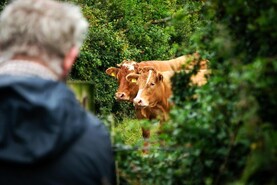


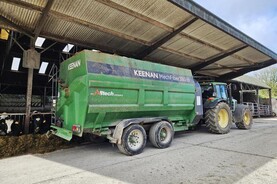
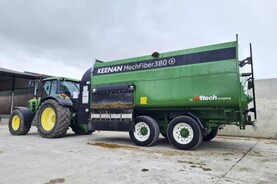
SHARING OPTIONS: